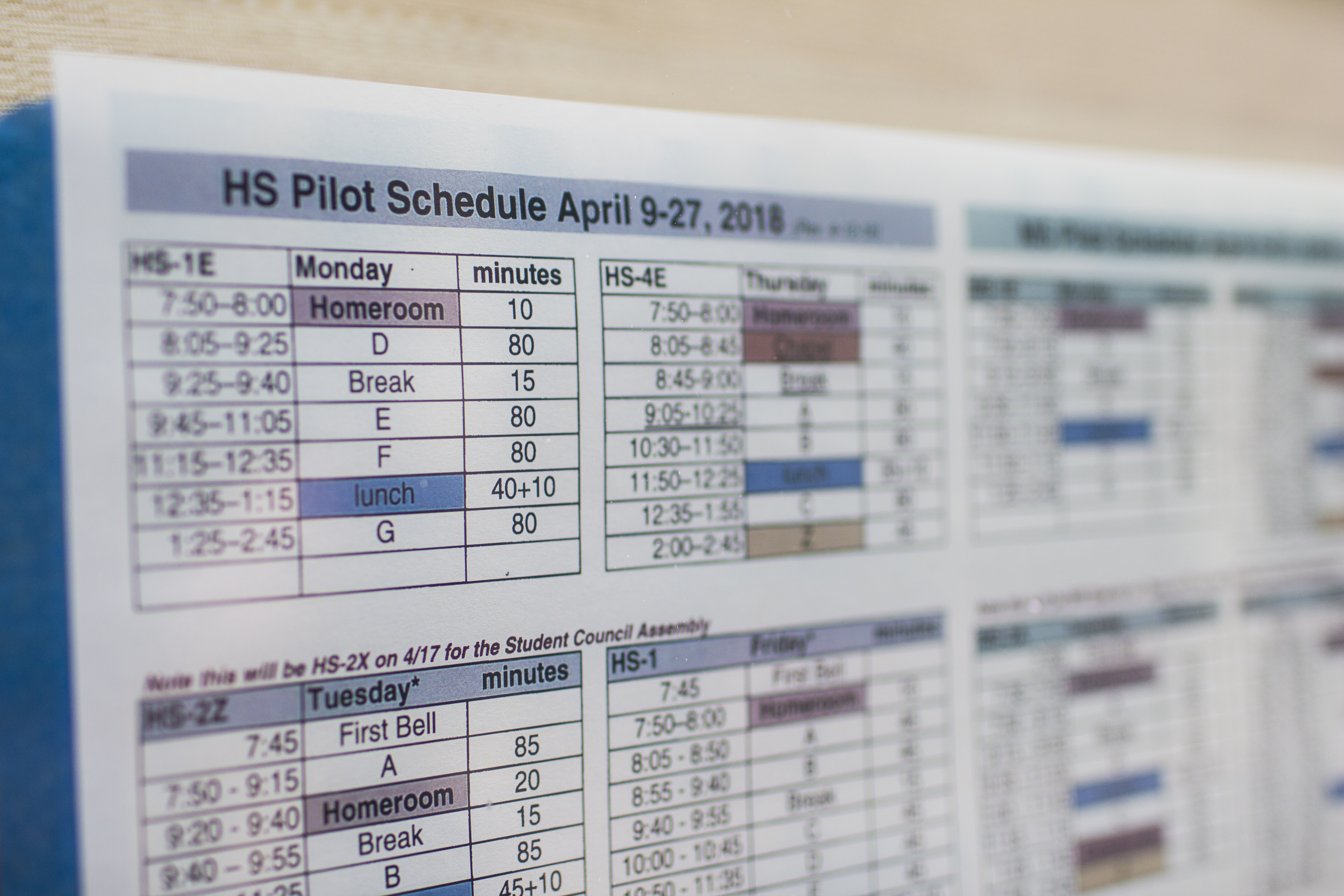New Pilot Schedule to Help Manage Workload

The Double Extended schedule, colloquially known to students as the double-double schedule, gives each class two extended periods per week while reducing the total number of classes per subject from four to three in a week. Periods A through C—each 80 to 85 minutes long—run on Tuesdays and Thursdays, while periods D through G meet on Monday and Tuesday, leaving Friday as the only weekday to have all seven classes.
Spearheaded by curriculum director Patricia Ota, high school principal Marsha Hirae and department chairs, the administration introduced this updated schedule as part of an effort to address HBA’s notoriously heavy workload problem. “The upper administration was interested in trying out a new structure to see if it could help with student management of course work,” Ota explained. “So we’ve been testing many different solutions to help keep homework at a reasonable and productive level.”
High school vice principal Ryan Frontiera echoed these thoughts, adding that “the main impetus was finding a schedule that best met student needs, especially as a way to balance how much homework and class preparation had to be done on a regular night.”
The main impetus was finding a schedule that best met student needs, especially as a way to balance how much homework and class preparation had to be done on a regular night. – Vice principal Ryan Frontiera
According to Ota, the goal of the new schedule is not to lessen the student’s overall homework load. Instead, it’s focus is to reduce the number of classes a student has to prepare for each day. Ota explained, “We are hoping that this schedule will help [students] focus their work for a few classes most nights rather than having to prep for all seven classes. [Students still] need to do all their homework to have the full learning experience.” Ota emphasized that because Friday has all seven classes, “students will still have to learn to plan ahead and not leave everything for the last minute.”
High and middle school Bible teacher Erin Schlittenhart is optimistic about the pilot schedule but points out that change requires an adjustment period. “Obviously, one is inclined to prefer the status quo,” she said, “but I do support whatever is best for the community… [In hindsight] I wish I spent my Spring break to prepare a bit better, but I have summer break to prepare for next year.”
Before the Double Extended schedule was officially announced, rumors of the change caused some anxiety among students. Many, including freshman Meredith Lau and senior Zachary Fujita, were apprehensive at the prospect of “suffering” through two extended periods each week. Fujita said, “Initially, I didn’t think I would care much for the new schedule. Extended classes can often make the school day seem longer, and the implementation of the new schedule would mean twice the amount of extended periods per week.”
But despite their initial concerns, many students have been pleasantly surprised by the schedule’s effect. Fujita reports that the schedule has allowed him more time to take a break and relax between having to get homework done.
Lau, on the other hand, appreciated that the extra extended period allowed her to better focus on her art class, as project-based subjects like the visual and performing arts often require longer blocks of class time to accommodate preparation and clean up.
After just one week of the new schedule, Fujita is convinced that the new time table should be adopted permanently, and could find no faults with the schedule in its current form. “Although it would not have an effect on my life as I will soon be leaving for college, I would like to see the new schedule become permanent.” Fujita said. “It has been working exceptionally well for me so far, and I believe after the three-week trial period is up, it will feel natural to most students.”
I would like to see the new schedule become permanent. It has been working exceptionally well for me so far, and I believe after the three-week trial period is up, it will feel natural to most students. – Zachary Fujita (’18)
Students who find the new schedule challenging should make sure to voice their concerns in the school-wide survey that will be sent out at the end of the pilot. According to Ota, if the pilot is successful, the new schedule could be implement as soon as the next school year. “We will probably institute [the new schedule] for parts of the term, wherever it fits. This structure wouldn’t work if there is a Monday holiday or if the week is not five days, so it won’t be a complete change,” Ota said. “However, if its a schedule that works, we will probably try to implement for the weeks that we can during the term.”
